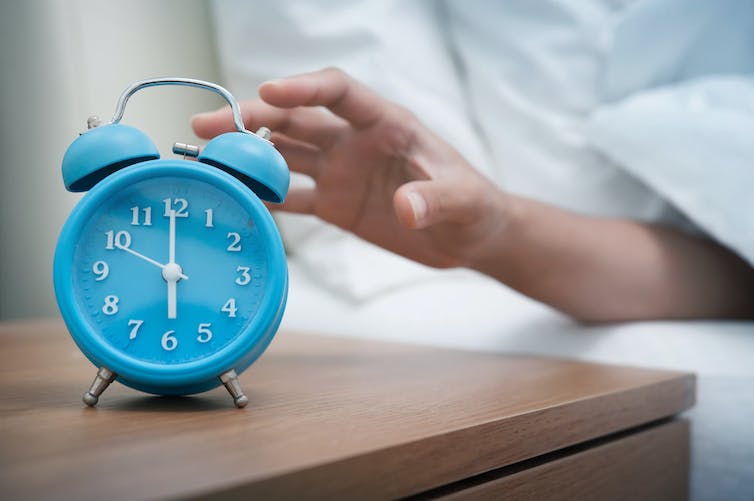
Timing is everything. For early risers and late-nighters alike, listening to your internal clock may be the key to success. From the classroom to the courtroom and beyond, people perform best on challenging tasks at a time of day that aligns with their circadian rhythm.
Circadian rhythms are powerful internal timekeepers that drive a person’s physiological and intellectual functioning throughout the day. Peaks in these circadian rhythms vary across individuals. Some people, known as larks or morning chronotypes, peak early and feel at their best in the morning. Others, known as owls or evening chronotypes, peak later in the day and perform best in the late afternoon or evening. And some people show neither morning nor evening preferences and are considered neutral chronotypes.
As a researcher seeking ways to improve cognitive function, I’ve explored whether your chronotype affects your mental performance. Understanding the kinds of mental processes that vary – or remain stable – over the course of a day may help people schedule their tasks in a way that optimizes performance.
Why your chronotype matters
Chronotype can be measured with a simple questionnaire that assesses things like your perceived alertness, preferred rising and retiring times and performance throughout the day. Even without a questionnaire, most people have a sense of whether they are a lark or an owl or fall somewhere in between. Do you wake up early, without an alarm, feeling sharp? Are you mentally drained and ready for pj’s by nine? If so, you are likely a morning type. Do you sleep late and wake feeling sluggish and foggy? Are you more energized late at night? If so, you are likely an evening type.
People perform best on many challenging mental tasks – from paying attention and learning to solving problems and making complex decisions – when these actions are synchronized with their personal circadian peaks. This is known as the synchrony effect. Whether you are an air traffic controller scanning the radar, a CFO reviewing an earnings report or a high school student learning chemistry, synchrony can affect how well you perform.
Much of the evidence for synchrony effects comes from lab studies that test both larks and owls early in the morning and late in the day. People with strong chronotypes are more vigilant and better able to sustain attention at their peak relative to off-peak times. Their memories are sharper, with better list recall and more success in remembering “to-do” tasks like taking medication.

eggeeggjiew/iStock via Getty Images Plus
People are also less prone to mind wandering and less distracted at their optimal time. For example, a study I conducted gave participants three weakly related cue words (such as “ship,” “outer” and “crawl”). They were tasked to find another word that linked all three (such as “space”). When my team and I presented misleading words alongside the cue words (such as “ocean” for ship, “inner” for outer and “baby” for crawl), those who were tested at synchronous times were better at ignoring the misleading words and finding the target solution than those who weren’t.
Synchrony also affects high-level cognitive functions like persuasion, reasoning and decision-making. Studies on consumers have found that people are more discerning, skeptical and analytical at their peak times. They invest more time and effort in assigned tasks and are more likely to search for important information. Consequently, people make better investment decisions, are less prone to bias and are more likely to detect scams.
At off-peak times it takes people longer to solve problems, and they tend to be less careful and more reliant on mental shortcuts, leaving them vulnerable to flashy marketing schemes. Even ethical behavior can be compromised at non-optimal times, as people are more likely to cheat at their off-peak times.
In the classroom and the clinic
The basic mental abilities that are affected by synchrony – including attention, memory and analytical thinking – are all skills that contribute to academic success. This connection is especially significant for teens, who tend to be night owls but typically start school early.
One study randomly assigned over 700 adolescents to exam times in the early morning, late morning or afternoon. Owls had lower scores relative to larks in both morning sessions, but this disadvantage disappeared for owls taking the exam in the afternoon. Early start times may put student owls a step behind larks.
Time of day may also be a consideration when conducting assessments for cognitive disorders like attention-deficit disorder or Alzheimer’s disease. Scheduling time may be particularly significant for older adults, who tend to be larks and often show larger synchrony effects than young adults. Performance is better at peak times on several key neuropsychological measures used to assess these conditions. Failing to consider synchrony may affect the accuracy of diagnoses and subsequently have consequences for clinical trial eligibility and data on treatment effectiveness.

Violeta Stoimenova/E+ via Getty Images
Of course, synchrony doesn’t affect performance on all tasks or for all people. Simple, easy tasks – like recognizing familiar faces or places, dialing a close friend’s phone number or making a favorite recipe – are unlikely to change over the day. Furthermore, young adults who are neither larks nor owls show less variability in performance over the day.
For those who are true early birds or night owls, tackling the toughest mental tasks at times that align with their personal circadian peaks could improve their outcomes. When small improvements in performance offer an essential edge, synchrony may be one secret to success.
![]()
Cindi May received funding from the National Institute on Aging. She currently serves on the board for Disability Rights South Carolina.
























